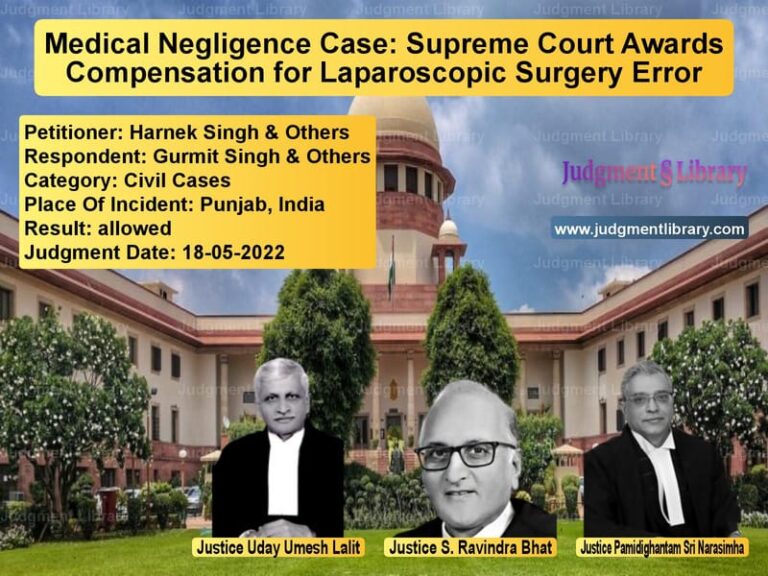Customs Duty and Warehouse Charges: Supreme Court Clarifies Priority in Sale Proceeds
The case of Union of India & Ors. vs. M/S. Associated Container Terminal Ltd. dealt with a dispute regarding the priority of customs duty and warehouse charges when goods remain uncleared in a warehouse beyond the permitted period. The Supreme Court’s decision clarified the order of recovery from sale proceeds under the Customs Act, 1962.
Background of the Case
One M/s. Kushang Apparel Ltd. imported CTV kits and filed six Bills of Entry on February 9, 2001. The customs department permitted the goods to be kept in a warehouse under Section 59 of the Customs Act, 1962. The warehouse period expired on February 28, 2002, but the importer failed to clear the goods and did not pay rent for the warehouse.
With the approval of customs authorities, multiple auction attempts were made under Section 63(2) of the Act. Despite several reductions in valuation, the goods were not successfully sold. Eventually, the warehouse authorities conducted a tender sale, with the highest bid being Rs. 41,44,555.
Dispute Over Customs Duty and Warehouse Charges
The customs authorities insisted that the sale proceeds should first be used to pay customs duty under Section 72 of the Act, citing the Supreme Court’s decision in Kesoram Rayon v. Collector of Customs, Calcutta. However, the respondent (warehouse-keeper) argued that they were entitled to recover warehousing charges before customs duty was deducted.
Arguments by the Petitioner (Union of India)
The Union of India raised the following arguments:
- The calculation of customs duty should be based on the date of deemed removal of goods from the warehouse.
- Customs duty has precedence over warehouse charges, as specified in Section 150(2) of the Customs Act.
- The sale was conducted under Section 72 and not under Section 63, meaning the proceeds should be allocated as per customs duty priority.
- The duty must be assessed at the rate applicable on the date of deemed removal, per the ruling in Kesoram Rayon.
Arguments by the Respondent (Associated Container Terminal Ltd.)
The respondent countered with the following points:
- The sale was conducted after obtaining necessary approvals, and the customs department had already realized part of its dues from the sale proceeds.
- Their right to recover warehousing charges before customs duty should be upheld.
- The customs authorities were incorrectly attempting to invoke additional charges beyond what was legally required.
- The warehouse had followed due process and should be prioritized under the relevant provisions of the Act.
Supreme Court’s Key Observations
The Supreme Court examined the relevant provisions and stated:
- The calculation of customs duty must be based on the sale proceeds and not on the duty applicable at the date of deemed removal.
- The warehouse-keeper has the right to recover storage charges before customs duty under Section 150(2) of the Act.
- The Central Board of Excise & Customs (CBEC) had issued clarifications confirming that customs duty should be calculated through backward valuation from the final sale price.
- The decision in Kesoram Rayon was not applicable in this case since the goods were not cleared by the importer but rather auctioned by the authorities.
Important Judicial Statements
The Supreme Court explicitly ruled:
“Customs duty must be assessed on the final sale price through backward calculation. The warehouse-keeper is entitled to recover storage dues before customs duty under the priority established in Section 150(2).”
The Court also emphasized:
“The Customs Act does not permit retrospective imposition of duty based on deemed removal where the goods have been auctioned after a lapse of the permitted period.”
Final Verdict
The Supreme Court upheld the High Court’s order, directing that the bank guarantee amount of Rs. 27,47,146 be refunded to the respondent within three months. This ruling clarified the correct priority for recovery of dues from auction proceeds and reinforced legal principles regarding customs duty calculations.
Petitioner Name: Union of India & Ors..Respondent Name: M/S. Associated Container Terminal Ltd..Judgment By: Justice A.M. Khanwilkar, Justice Hemant Gupta, Justice Dinesh Maheshwari.Place Of Incident: Faridabad, India.Judgment Date: 14-02-2020.
Don’t miss out on the full details! Download the complete judgment in PDF format below and gain valuable insights instantly!
Download Judgment: Union of India & Ors vs MS. Associated Cont Supreme Court of India Judgment Dated 14-02-2020.pdf
Direct Downlaod Judgment: Direct downlaod this Judgment
See all petitions in Customs and Excise
See all petitions in Tax Refund Disputes
See all petitions in Judgment by A M Khanwilkar
See all petitions in Judgment by Hemant Gupta
See all petitions in Judgment by Dinesh Maheshwari
See all petitions in dismissed
See all petitions in supreme court of India judgments February 2020
See all petitions in 2020 judgments
See all posts in Taxation and Financial Cases Category
See all allowed petitions in Taxation and Financial Cases Category
See all Dismissed petitions in Taxation and Financial Cases Category
See all partially allowed petitions in Taxation and Financial Cases Category







